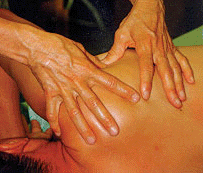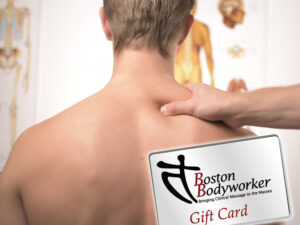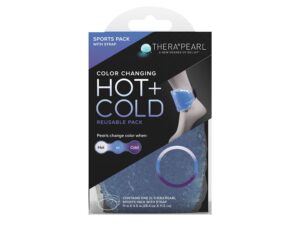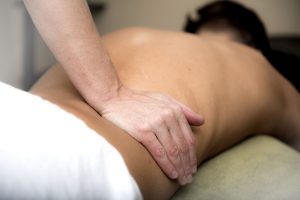Frozen Shoulder
By far, the coolest joint in the body (to me) is the shoulder. It moves in absolutely every direction. The hips are a close second, but there is limited mobility in certain planes of movement.
Mobility in the shoulder provides us all with a multitude of ways to perform very simple everyday activities. The ligaments that hold the upper arm bone, the humerus, a.k.a. the ‘funny bone’, in the socket are quite loose to allow for this wide range of motion. Because they are lax, they don’t do much to hold the shoulder together. Another fact is that the socket in which the top or the “head” of the humerus sits, is a very shallow, concave surface.
What really holds the shoulder together and stabilizes the joint are muscles that are referred to as the rotator cuff (no, it’s not your ‘rotary cup’). There are four small muscles that run from the shoulder blade to the humerus. These muscles completely surround the humerus like a sleeve or cuff. They are very dynamic, contracting to stabilize the shoulder when needed or relaxing to allow you to move the arm freely. The movement of our shoulder is so free and easy that we often take it for granted.
How does a shoulder “freeze“?
Frozen shoulder, also referred to as adhesive capsulitis, typically starts with a minor injury. For example, you may jar your shoulder by tripping and breaking your fall with an outstretched arm. It may also start after an inflammatory problem, like a little tendinitis or bursitis of the shoulder.
When we experience pain in any joint, we will instinctively limit the movements of this area in the hopes of avoiding any further discomfort. Although it is important to limit the movement in the first 24-48 hours of such an injury, further prolonged splinting of the shoulder joint can create a vicious cycle that begins to see a buildup of adhesions (scar tissue). This limited movement in conjunction with the buildup of scar tissue can began to create fibrous tissue around the ligaments, causing them to “lock down”. The greatest area of concern is the lower part of the joint where the ligamentous tissue becomes most lax when immobilized.
Once these adhesions begin to form, the shoulder starts to feel stiff and uncomfortable. You’ll limit your movement in response to the pain and the reduced movement causes more stiffness. Before you know it, you’re trapped in what seems to be a malicious cycle.
If you don’t take care of the problem immediately, it will progress from a little discomfort to severe pain that can interfere with some of the most mindless tasks such as brushing your teeth or combing your hair. After a period of prolonged disuse, your shoulder will become, in a sense, frozen. This lack of movement also begins to cause pain both down the arms and into your neck, causing a cascading impact of what started out as a minor injury.
 If you catch this problem in its early stages, some self-care exercises can assist in regaining full mobility of the joint. Massage is another means in which to tackle this issue early on, but as the adhesions become thick and the pain slowly increases, manual therapy can seem like a form of medieval torture. Personally, I have handled many advanced cases of frozen shoulder with very positive outcomes, but it was not without the great efforts of my patients to be capable of both handling this discomfort (to put it mildly) as well as significant efforts on their part when it came to self-care.
If you catch this problem in its early stages, some self-care exercises can assist in regaining full mobility of the joint. Massage is another means in which to tackle this issue early on, but as the adhesions become thick and the pain slowly increases, manual therapy can seem like a form of medieval torture. Personally, I have handled many advanced cases of frozen shoulder with very positive outcomes, but it was not without the great efforts of my patients to be capable of both handling this discomfort (to put it mildly) as well as significant efforts on their part when it came to self-care.
Conventional treatment for severe cases usually involves manipulation while under an anesthetic. A surgeon will put you under, and while you are asleep, force the joint through a complete range of motion, pulling apart any adhesions. In certain cases, surgery may be required where they need to go in and cut through the adhesions.
Typically, prior to this approach, the doctor may recommend the use of NSAID’s or a cortisone shot. Regardless, one should not expect a speedy resolution to a true condition of frozen shoulder.
There are cases however, that I have been presented with, that all signs and previous diagnosis’s pointed to the shoulder being frozen, but in actuality, there were some stubborn trigger points causing the shoulder to remain immobilized due to the amount of pain the patient was feeling when moving or even while sleeping. These trigger points can be addressed and neutralized to the point where a fully recovery is achieved without the use of any surgery, cortisone or medieval torture rituals and typically in just a few treatments.
If you feel that you may be in the early stages of what seems like frozen shoulder, please discuss your treatment options with your massage therapist before a minor injury becomes a frozen pain.
Ready to #feelbetter?
You're just a click away from a wicked good massage!
-

60 Minute Massage Gift Card
$170.00 Add to cart -

90 Minute Massage Gift Card
$255.00 Add to cart -

Mini Aer Small Room Air Purifier
$149.00 Add to cart -
Sale!

Thera-Pearl Sports Pack/Hot Cold
Original price was: $14.99.$12.99Current price is: $12.99. Add to cart -

3 Somadome Sessions Gift Card
$135.00 Add to cart -

20 Minute Somadome Gift Card
$45.00 Add to cart -
Sale!

TheraBand® Stretch Strap
Original price was: $19.99.$14.99Current price is: $14.99. Add to cart -

TheraBand CLX Connective Loop
$14.99 Select options
Energy Boosters
Energy Boosters Ways to Get You Through the Day No amount of coaxing, pleading, or pedal pumping could get the engine in the rental car to turn over. It was going nowhere. The travelers had filled the car with unleaded fuel, but it had a diesel engine. It had been able to run a little…
Read MoreWhat is Qi?
What is Qi? A fundamental concept of traditional Chinese medicine (TCM) dating back over 3,000 years, qi (pronounced “chee”) is the Chinese word for energy, which also carries with it connotations of “air,” “breath,” and “life force.” In TCM, it is understood that everything from humans and animals to rocks and trees is filled with…
Read MoreWhy Buy Organic?
Why Buy Organic? Is the Higher Price Worth It? While shopping in your grocery store’s produce section, you may notice the organically grown apples are pocked and not as big and perfectly round as the conventional produce, but they are more expensive. What’s the difference, and which do you choose? Your decision may significantly impact…
Read MoreAre You Making the Most of Your Massage?
Are You Making the Most of Your Massage? How to Prolong the Benefits of Bodywork A massage works in wonderful ways, easing stress and pain, calming the nervous system, increasing circulation, loosening tight muscles, stimulating internal organs, and enhancing skin. The multiplicity of physiological responses sends a simple, clear message to the mind: Massage feels…
Read MoreThe Case for Chocolate
The Case for Chocolate New Studies Show Health Benefits It’s not like we need a specific reason to eat chocolate, but it doesn’t hurt that studies are finding increasing health benefits associated with the popular indulgence. While chocolate is high in sugar and saturated fat, it does contain chemical compounds with proven benefits, so enjoy–in…
Read MoreThe Wonders of Water
The Wonders of Water For Skin Health and More Shelley Burns, N.D. Creams, nutritional supplements, treatments, lotions, and potions. We are always looking for the next miracle product to keep skin looking healthy and young. However, there is one essential, inexpensive, and often overlooked nutrient right at your fingertips:water. Just as a car cannot function…
Read MoreInvest In Your Health
Invest in Your Health Massage Offers Excellent Return onInvestment “Invest for the long term” is great financial advice, but it’s also great healthcare advice. Never is investing for the long term more important than when you are making day-to-day decisions about your health. There are short-term gains from taking care of your health, to be…
Read MoreLife Hack: Iced Cubes
Life Hack: Coffee Cubes (Redux) As usual in New England, we have gone from Winter to Summer, with Spring being an absentee season (again). Since it feels like Summer is already here, I thought it best to give you a Life Hack that is an oldy, but a goody! Iced Coffee…..CUBES! #mindblown Yes. I have offered this…
Read MoreMake a Great Save to Avoid Back Pain
Make a Great Save to Avoid Back Pain 7- Stretches in 7-Minutes I was speaking the other day with one of our therapists and we were discussing our role in helping our patients. I was explaining that a comment I often tell new patients is; “These are hands, not magic wands”. Patients often seek out…
Read MoreTime for Sleep
Time for Sleep As a nation, we may be divided, but there is one common bond that unites us all around the world; sleep. We all need sleep in order to be capable of performing every day tasks. Sleep is an imperative part of the human experience. Without a good night’s sleep, our bodies will slowly…
Read More









